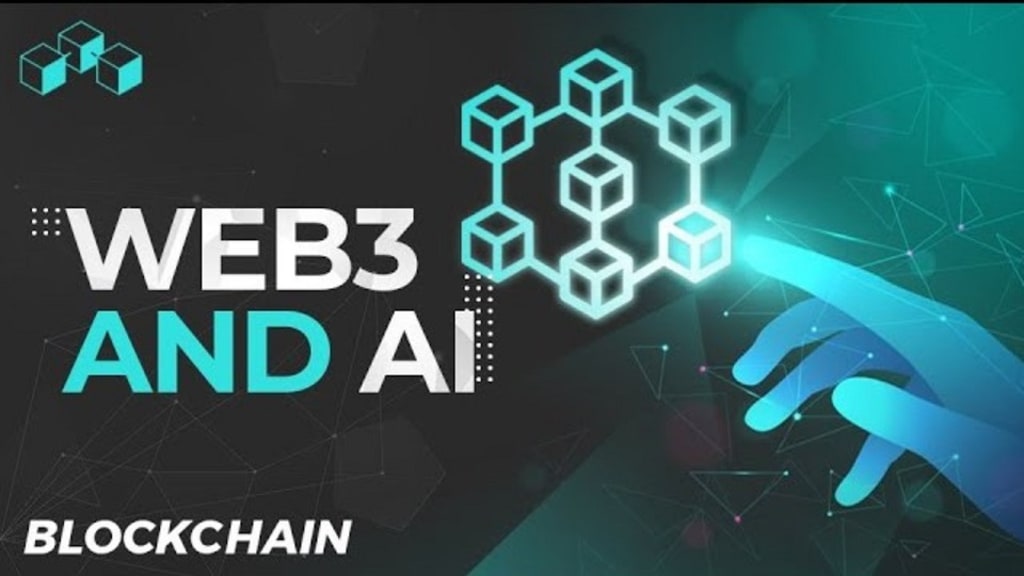Exploring the Relationship between AI and Web3: Unlocking Synergies for a Decentralized Future
The relationship between AI and Web3 presents an exciting opportunity to unlock synergies and pave the way for a decentralized future. By harnessing the power of AI within the Web3 ecosystem, we can achieve data ownership, enhanced machine learning models, trust and transparency, smart contract integration, and AI-driven governance. However, to fully realize these synergies, it is crucial to address challenges related to scalability, data quality, and privacy. With continuous innovation and collaboration, the integration of AI and Web3 has the potential to revolutionize industries, empower individuals, and shape a more decentralized and inclusive digital landscape.

Introduction:
As technological advancements continue to shape our world, two prominent fields have emerged: Artificial Intelligence (AI) and Web3. AI, with its ability to simulate human intelligence, and Web3, with its focus on decentralization and blockchain technology, are revolutionizing various industries. This blog delves into the relationship between AI and Web3, exploring how their integration can unlock new possibilities and shape the decentralized future.
Understanding AI and Web3:
Artificial Intelligence refers to the simulation of human intelligence in machines, enabling them to perform tasks that typically require human cognition. It encompasses machine learning, natural language processing, computer vision, and other techniques. On the other hand, Web3 is an evolution of the traditional web (Web2), emphasizing decentralization, data ownership, and peer-to-peer interactions facilitated by blockchain technology.
Synergies between AI and Web3:
Data Ownership and Privacy: Web3 promotes the idea of individuals having ownership and control over their data. AI can leverage this decentralized data ecosystem to access diverse and valuable datasets while ensuring privacy and security. Decentralized AI models can be trained on user-owned data, reducing the reliance on centralized entities.
Enhanced Machine Learning Models: Web3's decentralized nature allows for the aggregation of data from various sources. This abundance of data can fuel AI models, enabling them to learn from diverse perspectives and improve their accuracy and robustness. Web3 can facilitate the creation of decentralized data marketplaces where AI developers can access high-quality datasets.
Trust and Transparency: Web3's underlying blockchain technology provides transparency and immutability. This can be leveraged to enhance the trustworthiness of AI systems. By recording AI model training and inference processes on the blockchain, stakeholders can audit and verify the integrity of AI outcomes, addressing concerns around bias, fairness, and accountability.
Smart Contracts and AI: Smart contracts, an integral part of Web3, are self-executing agreements written on the blockchain. AI algorithms can interact with smart contracts, enabling the automation of various processes. For example, AI-powered oracles can provide real-world data to smart contracts, facilitating autonomous decision-making.
AI-Driven Governance: Web3 communities often rely on decentralized governance models. AI can play a role in these models by analyzing vast amounts of data and providing insights for decision-making. AI-powered governance mechanisms can enhance community voting systems, assess proposals, and ensure efficient resource allocation.
Challenges and Considerations:
Scalability: AI algorithms, particularly deep learning models, require significant computational resources. Web3 protocols need to address scalability concerns to handle the computational demands of AI. Innovations like sharding, layer 2 solutions, and decentralized cloud computing platforms can help mitigate scalability challenges.
Data Quality and Trust: While Web3 aims to provide access to diverse datasets, ensuring the quality and trustworthiness of these datasets can be challenging. Mechanisms for data validation, reputation systems, and data curation protocols need to be developed to maintain the integrity of AI training.
Privacy-Preserving AI: As AI models access decentralized data, preserving privacy becomes crucial. Techniques such as federated learning, secure multi-party computation, and homomorphic encryption can be employed to ensure privacy while training AI models on distributed data sources.
Conclusion:
The integration of AI and Web3 holds immense potential for transforming industries and shaping a decentralized future. By leveraging the principles of Web3, AI can benefit from decentralized data, enhanced trust, and improved governance mechanisms. Simultaneously, AI can contribute to Web3's growth by providing intelligence, automation, and insights.
The relationship between AI and Web3 presents an exciting opportunity to unlock synergies and pave the way for a decentralized future. By harnessing the power of AI within the Web3 ecosystem, we can achieve data ownership, enhanced machine learning models, trust and transparency, smart contract integration, and AI-driven governance. However, to fully realize these synergies, it is crucial to address challenges related to scalability, data quality, and privacy. With continuous innovation and collaboration, the integration of AI and Web3 has the potential to revolutionize industries, empower individuals, and shape a more decentralized and inclusive digital landscape.
About the Creator
Enjoyed the story? Support the Creator.
Subscribe for free to receive all their stories in your feed. You could also pledge your support or give them a one-off tip, letting them know you appreciate their work.





Comments
There are no comments for this story
Be the first to respond and start the conversation.